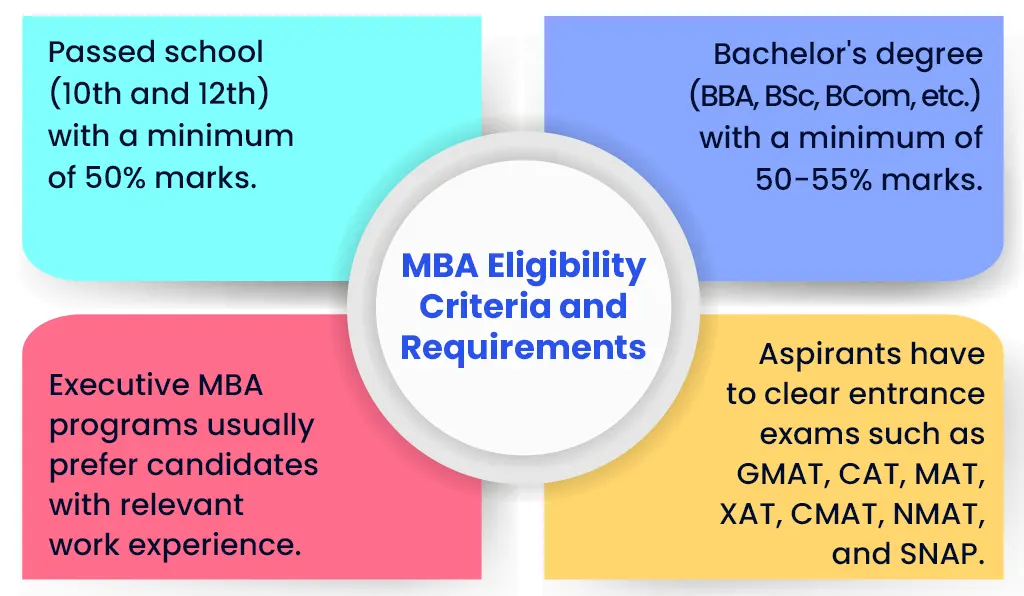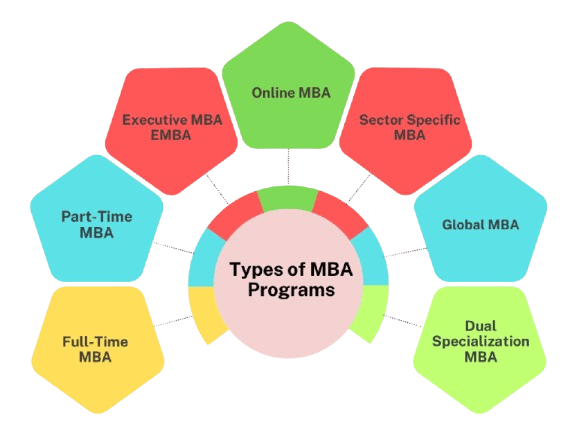
- What is a 1-Year MBA?
- Eligibility Criteria
- Admission Process
- Top 1-Year MBA Colleges in India
- Curriculum Overview
- Pros & Cons
- Career Scope
- Industry Partnerships
What is a 1-Year MBA?
A 1-Year MBA is an accelerated Master of Business Administration program designed to deliver the core components of a traditional two-year MBA within a condensed, intensive 12-month timeframe. Aimed at professionals who already possess a strong foundation in business, significant work experience, or certifications like PMP training this fast-track program emphasizes speed and efficiency without compromising on academic rigor or leadership development. Students typically engage in a rigorous curriculum covering areas such as finance, marketing, strategy, operations, and management, often with fewer elective options and a streamlined internship or capstone project. The program is particularly attractive to individuals seeking a quicker return to the workforce, career advancement, or a shift in industry or function without the extended time commitment or financial investment of a two-year MBA. Most 1-Year MBA programs start in the summer and run continuously through the following year, requiring a high level of commitment, time management, and focus. Ideal candidates are often mid-career professionals or entrepreneurs looking to sharpen their business acumen, leverage credentials like PMP training, expand their global network, and accelerate their career trajectory. Institutions offering these programs typically seek applicants with clear goals, strong academic backgrounds, and proven leadership potential, making the 1-Year MBA a compelling choice for driven, time-conscious professionals.
To Explore PMP in Depth, Check Out Our Comprehensive PMP Certification Training To Gain Insights From Our Experts!
Eligibility Criteria
To apply for a 1-Year MBA program, candidates must meet certain academic and professional requirements that demonstrate their readiness for the program’s rigorous and fast-paced nature. These criteria may vary slightly between institutions, but the following are commonly expected. In addition, students may explore MBA Finance Project Topics ideas to prepare for practical assignments and enhance their understanding of financial management and analysis.
- Bachelor’s Degree: Applicants must hold a recognized undergraduate degree in any discipline from an accredited institution.
- Work Experience: Most 1-Year MBA programs require 2–5 years of full-time, relevant work experience, with some programs preferring candidates with leadership or managerial roles.
- GMAT/GRE Scores: A valid GMAT or GRE score is often required, although some programs may offer waivers based on academic or professional achievements.

- English Language Proficiency: International applicants must usually demonstrate proficiency in English through tests like TOEFL or IELTS if their undergraduate education was not in English.
- Strong Academic Record: A solid academic background, particularly in quantitative subjects, is important due to the program’s intensity and fast pace.
- Letters of Recommendation & Statement of Purpose: Applicants must typically submit professional references and a statement outlining their career goals, motivation for pursuing the MBA, and how the program aligns with their aspirations.
Admission Process
The admission process for a 1-Year MBA program is designed to identify motivated, experienced professionals who are ready to take on the challenges of an accelerated business education. It typically begins with an online application that includes personal details, academic history, professional experience, and standardized test scores such as the GMAT or GRE, unless waived. Candidates with relevant credentials like PMP training often stand out, as such certifications reflect strong project management skills and professional discipline. Applicants must also submit a well-crafted resume, a statement of purpose or personal essay outlining their career goals and reasons for pursuing a 1-Year MBA, and two or more letters of recommendation from professional or academic contacts. For non-native English speakers, proof of English proficiency through tests like TOEFL or IELTS may be required. Shortlisted applicants are often invited for a personal or virtual interview, which allows the admissions committee to assess the candidate’s communication skills, leadership potential, and alignment with the program’s values. Some institutions may also require video essays or case study assessments as part of the selection process, where experience or methodologies related to PMP training can further strengthen a candidate’s profile. Admission decisions are typically made on a rolling basis or within specific rounds, and candidates are notified via email. The process is competitive, favoring applicants who can demonstrate their readiness, clarity of purpose, and ability to contribute to a high-performance learning environment.
Are You Considering Pursuing a Master’s Degree in PMP? Enroll in the PMP Masters Program Training Course Today!
Top 1-Year MBA Colleges in India
- Indian School of Business (ISB), Hyderabad/Mohali: Offers the Post Graduate Programme in Management (PGP), highly regarded for its global faculty, strong alumni network, and international collaborations.
- IIM Ahmedabad (IIMA): Offers the Post Graduate Programme in Management for Executives (PGPX), consistently ranked among the top executive MBA programs globally.
- IIM Bangalore (IIMB): Offers the Executive Post Graduate Programme in Management (EPGP), known for its leadership development and global immersion module.
India has emerged as a hub for high-quality 1-Year MBA programs designed for mid-career professionals seeking to accelerate their careers without a long break from the workforce. These programs are offered by prestigious institutions that combine academic rigor, industry exposure, and global perspectives. Here are some of the top 1-Year MBA colleges in India:
- IIM Calcutta (IIMC): Offers the MBA for Executives (MBAEx), combining academic excellence with real-world business insights and strong corporate connections.
- XLRI Jamshedpur: Offers the Executive PGDM (General Management), a full-time residential program focusing on leadership and strategic thinking.
- SP Jain Institute of Management and Research (SPJIMR), Mumbai: Offers the Post Graduate Programme in Management (PGPM), ideal for professionals with substantial work experience and a drive for rapid career growth.
- Time Efficiency: Go with a shorter duration that allows professionals to return to the workforce quickly, minimizing career interruption.
- Cost Effective: Go with lower overall tuition and living expenses compared to traditional two-year MBA programs.
- Ideal for Experienced Professionals: Go with a curriculum tailored for individuals who already have solid work experience and want to move into leadership roles. Con
- Intense Workload: Go with a highly compressed schedule that demands strong time management, leaving little room for breaks or internships.
- Limited Networking Time: Go with fewer opportunities for building deep connections with peers and alumni due to the shorter program length.
- Not Ideal for Career Switchers: Go with limited internship opportunities, which may not suit candidates looking for a major industry or function change.
Are You Preparing for PMP Jobs? Check Out ACTE’s Project Management Interview Questions & Answer to Boost Your Preparation!
Curriculum Overview
The curriculum of a 1-Year MBA program is carefully structured to deliver a comprehensive management education within a condensed time frame, combining academic rigor with practical business insights. Designed for professionals with prior work experience, the program typically begins with core courses in key functional areas such as finance, marketing, operations, strategy, human resources, and economics, building a solid foundation in business fundamentals. These are followed by advanced electives that allow students to specialize in areas like leadership, entrepreneurship, digital transformation, analytics, or global business, depending on their career goals. Many programs incorporate experiential learning through case studies, simulations, live consulting projects, and industry interactions to ensure real-world application of concepts. Global immersion modules, leadership workshops, and peer learning from a diverse cohort further enrich the experience. Capstone projects or strategic assignments are often included towards the end of the program to synthesize learning and apply it to real business challenges. For aspirants aiming to pursue this accelerated path, choosing from the Best MBA Colleges in India ensures access to high-quality faculty, robust industry connections, and strong placement opportunities. The fast-paced nature of the curriculum demands strong time management and active participation, fostering a high-performance environment. Despite its shorter duration, the 1-Year MBA curriculum is designed to match the depth and quality of traditional two-year programs, preparing graduates for accelerated career growth and leadership roles across industries.

Pros & Cons
A 1-Year MBA offers a fast-track route to career advancement, but it’s important to weigh both its advantages and challenges before applying. Below are some key pros and cons:
ProAre You Interested in Learning More About PMP? Sign Up For Our PMP Certification Training Today!
Career Scope
The career scope after completing a 1-Year MBA is broad and promising, especially for mid-level professionals aiming to accelerate their growth or transition into leadership roles. Graduates are often well-positioned to take up senior management positions in fields such as consulting, finance, marketing, operations, and general management. The program’s focus on strategic thinking, problem-solving, and real-world application equips candidates with the skills needed to drive business decisions and lead teams effectively, while also imparting foundational knowledge related to Learn Key Objectives of Management Accounting such as planning, controlling, and decision support for businesses. Many 1-Year MBA graduates also use the degree to transition into new industries or functions, although this may be more seamless for those with related experience. For entrepreneurs or those aspiring to start their own ventures, the program provides valuable business acumen, exposure to innovation, and access to a supportive alumni network. Companies across sectors, including tech, healthcare, FMCG, and manufacturing, actively recruit from top 1-Year MBA programs in India and abroad. Additionally, global exposure and international modules offered by many institutions further enhance cross-cultural understanding and open doors to global opportunities. While the absence of a long internship period may limit certain career switches, the strong placement support, industry connections, and credibility of top business schools ensure that graduates enjoy a robust and diverse range of career paths post-MBA.
Industry Partnerships
Industry partnerships play a crucial role in enhancing the value and impact of 1-Year MBA programs by bridging the gap between academic learning and real-world business practices. These collaborations allow institutions to align their curriculum with current industry demands, ensuring that students gain relevant and updated skills. Top business schools in India offering 1-Year MBA programs often have strong ties with leading companies across sectors such as consulting, finance, IT, manufacturing, e-commerce, and healthcare. These partnerships translate into guest lectures by industry leaders, live case studies, company-sponsored projects, networking events, and placement opportunities. Many programs also offer industry immersion modules where students work directly with organizations to solve real business challenges, gaining hands-on experience and insights, while applying frameworks and methodologies similar to those taught in PMP training These interactions not only enhance practical learning but also help students build strong professional networks. In addition, corporate partners often participate in curriculum development, ensuring that course content remains relevant and aligned with evolving business needs. For professionals looking to accelerate their careers, such collaborations provide exposure to current trends, leadership practices, global business environments, and project management expertise gained through PMP training. Ultimately, strong industry partnerships significantly boost the credibility, learning experience, and career outcomes of a 1-Year MBA, making it a strategic choice for ambitious professionals.

